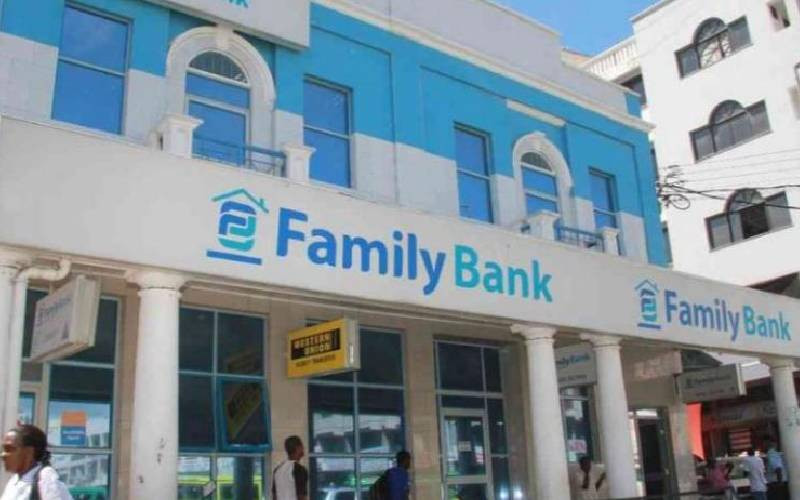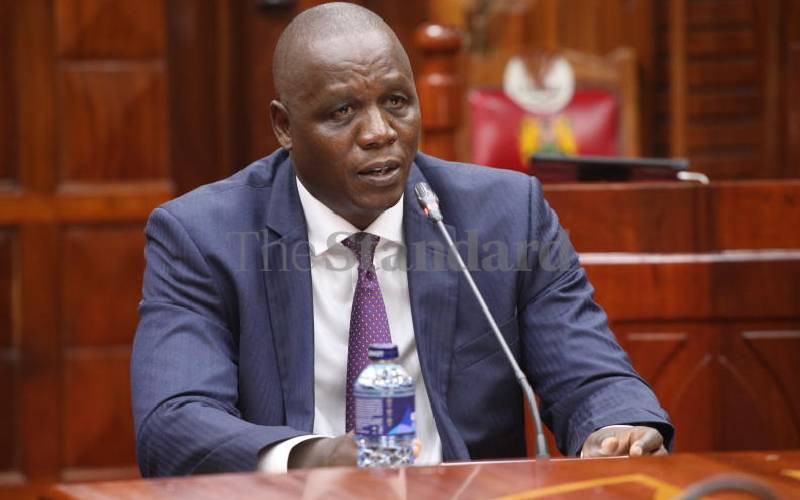
The infamous period of lawlessness in the US, popularly known as the Wild West, initially found a new home in the World Wide Web.
With time, however, American authorities have policed the whole length and breadth of the Internet, ruthlessly dealing with digital miscreants whenever they find them.
Spooked by the harsh edicts in their home country, these digital anarchists have fled to other parts of the cyber-world where regulation is lax.
Kenya’s unmanned cyber space has particularly been attractive to Silicon Valley-based digital lenders who, joined by their local variants, have created a new financial sub-sector where they have operated with impunity.
It would take a lot of explaining to persuade critics of digital lenders, including Central Bank of Kenya (CBK), from this line of thought.
CBK Governor Patrick Njoroge, who has in the past linked digital lending to money laundering and terrorism financing, last week barred lenders from using the credit reference bureaus (CRBs), effectively denying them a critical tool in assessing creditworthiness of a potential borrower.
Besides unregulated mobile-based lenders, CBK also withdrew the approvals granted to unregulated credit-only lenders as third party credit information providers to CRBs.
“The withdrawal is in response to numerous public complaints over misuse of the credit Information System by the unregulated digital and credit-only lenders, and particularly their poor responsiveness to customer complaints.
Thus, unregulated digital and credit-only lenders will no longer submit credit information on their borrowers to CRBs,” said CBK in a statement.
This is a blow to hundreds of fintech credit providers such as Branch International and Tala, which had become household names with nearly every functional smartphone in Kenya having a digital lending app.
Major setback
Tala’s East African Marketing Director Kevin Kaburu, who chairs the Digital Lenders of Kenya Association (DLAK), an umbrella for mobile-based lenders in Kenya, said the CBK order was a major setback as not all digital lenders or credit-only institutions have been behaving irresponsibly in the use of CRBs.
“In any case the DLAK members will comply with the CBK directive as we continue to consult with the regulators on the best way forward,” he said in a statement.
Some of the digital credit providers such as Branch and Tala have raised billions from reputable investors including World Bank’s investment wing, International Finance Corporation (IFC), and they cannot afford to lose their money.
Stay informed. Subscribe to our newsletter
Unregulated digital lenders and microfinance institutions have not been in Dr Njoroge’s good books. Last year, in his effort to nab holders of dirty cash by withdrawing the old Sh1,000 notes, the governor fingered the two as probably his weakest link in the fight against illicit financing.
He compared the ubiquitous mobile lending platforms to “your typical money laundering schemes” which, he said, posed a serious threat to the country’s financial health.
“Where are they getting the money from? I mean, you can see that this could be your typical money laundering scheme,” said the governor in a press briefing.
Earlier in July, CBK and other financial regulators including Capital Markets Authority, Insurance Regulatory Authority, Ministry of Trade, Industry and Co-operatives, Retirement Benefits Authority and Sacco Societies Regulatory Authority, advised the public to only deal with “regulated and licensed” financial providers.
This, in effect, left prominent digital credit providers such as Tala and Branch - which were registered as companies.
In a notice, the regulators sought to draw the attention of the public to the emergence of unlicensed financial services and products.
“These services include online pyramid schemes, credit and savings schemes as well as fraudulent mobile loan applications downloadable from mobile app stores, including Google Play and Apple Store,” said the regulators.
Three factors interacted to create a thriving market for digital credit providers.
The ubiquity of mobile money where almost every adult uses their mobile phone to send money, availability of cheap mobile Internet and rigid commercial banks that have made it hard for the majority of people in the informal sector to access credit have all contributed to the proliferation of digital lending apps.
There are over 100 digital lending apps on Google Store offering micro-loans of between Sh500 and Sh50,000. Besides Branch and Tala, other unregulated digital lenders include Okolea, Mkey and Utunzi.
Their annual interest on loans, including fees and fines can be as high as 1,685 per cent, according to a calculation by development organisation Financial Sector Deepening (FSD).
The allure of using mobile phones as a tool for financial services is laying debt traps for many borrowers, with most stuck in a vicious cycle of borrowing from one digital credit provider to pay another.
Another 2019 survey by FSD showed that 14 per cent of the digital borrowers were balancing loans from more than one digital lender, pointing to a refinancing crisis in which one borrows from Paul to pay Peter.
Six per cent of the respondents in the survey said they used the money to repay other loans, both digital and non-digital.
That is why to some observers, digital lenders have been nothing but sophisticated shylocks. They may not have employed crude methods of debt recovery as your typical shylock like breaking into people’s homes and making away with a home appliance, but a few of them have perfected cyber-bullying and spamming as a means to get back their money.
True, there were a few that would simply bombard borrowers with calls even as they forwarded their names to the three CRBs for blacklisting.
This worked out well for them. A defaulter listed at CRB will not only be unable to access credit from other financial providers, but some employers also require job-seekers to show proof that they had been cleared by CRBs.
Confidentiality
Stories abound of how some of the unregulated digital lenders drove defaulting borrowers into depression.
The lenders surreptitiously shuffled through the borrowers’ phone books looking for contacts with surnames that resembled that of the borrower.They would then call this family or friend on the contact list asking them to inform the borrower to pay up their loan.
This was contrary to the requirement of customer confidentiality.
However, an incident that saw a borrower commit suicide, according to an article in a local daily, saw Njoroge’s patience with unregulated digital lenders snap.
“In November last year (2018), a lady came to the Central Bank to explain to us that her husband had committed suicide after getting involved with one of these lenders,” CBK Deputy Governor Sheila M’Mbijjewe was quoted as saying by the local daily.
It was then resolved that there was need for regulation - the sticking point was on who between the National Treasury and CBK was to bell the cat.
A major concern is how some of the lenders have been operating on different standards from those in their home countries. While most of the American companies knew of tighter controls at home, they took advantage of the lax regulatory environment in Kenya to extract huge profits at the expense of consumers.
Last year, internet giant Google came up with new regulations that prohibited digital lenders that engaged in predatory lending from its App store.
Apps for personal loans, noted Google, were required to disclose the minimum and maximum period for repayment. They also had to show the maximum Annual Percentage Rate (APR), which generally includes interest rate plus fees and other costs for a year, or similar other rate calculated consistently with local law.
“In the United States, we do not allow apps for personal loans where the APR is 36 per cent or higher. Apps must display their maximum APR, calculated consistently with the Truth in Lending Act (TILA),” said Google.
Yet in Kenya, according to calculation done by FSD, the APR for non-banks, including fintech lenders could be as high as 1685 per cent.
Consent before sharing customer’s data and customers’ right to access and use own data only applies to users in the European region under the GDPR framework.
If there are institutions that had staked their hopes on the spoils of last-mile financial inclusion that has been trumpeted from the highest echelons of decision making, it is the digital lenders. And it looked like they were getting what they wanted.
According to FinAccess, a survey on financial inclusion that is done every three years by CBK, Kenya National Bureau of Statistics and FSD, use of digital loan apps registered a jump in 2019 to 8.3 per cent compared 0.6 per cent in 2016.
The increase was the highest compared to other financial providers including banks and Saccos.
 The Standard Group Plc is a
multi-media organization with investments in media platforms spanning newspaper
print operations, television, radio broadcasting, digital and online services. The
Standard Group is recognized as a leading multi-media house in Kenya with a key
influence in matters of national and international interest.
The Standard Group Plc is a
multi-media organization with investments in media platforms spanning newspaper
print operations, television, radio broadcasting, digital and online services. The
Standard Group is recognized as a leading multi-media house in Kenya with a key
influence in matters of national and international interest.
 The Standard Group Plc is a
multi-media organization with investments in media platforms spanning newspaper
print operations, television, radio broadcasting, digital and online services. The
Standard Group is recognized as a leading multi-media house in Kenya with a key
influence in matters of national and international interest.
The Standard Group Plc is a
multi-media organization with investments in media platforms spanning newspaper
print operations, television, radio broadcasting, digital and online services. The
Standard Group is recognized as a leading multi-media house in Kenya with a key
influence in matters of national and international interest.









